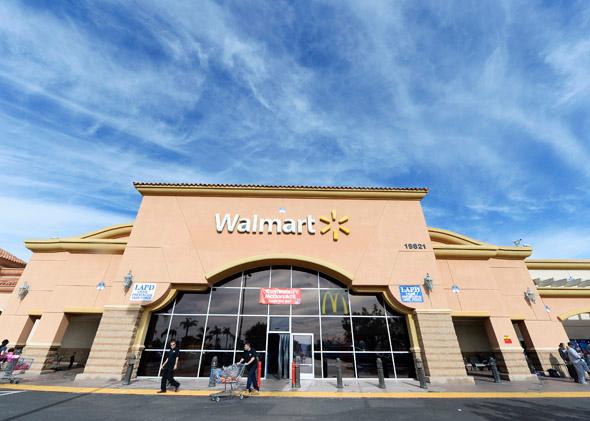Earlier this month, Walmart made a pair of unfortunately timed announcements. First, on Oct. 6, Walmart said it would begin working with DirectHealth.com, an online health insurance agency, to help shoppers compare coverage options and sign up for Medicare or plans on the Affordable Care Act exchanges. The very next day, Walmart stated it would cut health insurance for 30,000 part-time workers and raise premiums for its full-time employees, effective Jan. 1.
Walmart is among several retailers racing to make a name for itself in the nearly $3 trillion U.S. health care market. And, in many ways, it’s already proven to be a leader. In 2006, Walmart introduced its $4 prescription program, which cut the cost of roughly 300 generic drugs to $4 for a 30-day supply. It has dozens of simple-service clinics that test for common ailments and provide vaccinations, and this year has focused on rolling out a handful of primary care facilities that charge $40 per visit in Texas, South Carolina, and Georgia. The partnership with DirectHealth.com is a logical next step in Walmart’s push into wellness—a perk that might help draw consumers into Walmart’s stores and build their trust in its brand for not just cheap groceries, but also cheap health services.
At the same time, Walmart’s interest in building faith in its health offerings does not extend to its own employees. It made that much clear when it slashed benefits and raised premiums the day after publicizing its DirectHealth.com initiative. People are already sensitive when it comes to health services. Should they trust a giant corporation to handle them, especially one that appears to be so callous about the health care of its own employees?
The simple answer, health policy experts say, is yes. “Consumers are going to benefit from new entrants who think more like retailers than health care providers,” says Zack Cooper, professor of health policy and management at the Yale School of Public Health. “If I had one word to describe Walmart coming in, it would be cool.” The influx of retailers like Walmart into health care means that consumers are suddenly getting more information about and access to crucial services. While many doctor’s offices are used to operating from 9 to 5, Cooper says that retailers are starting to extend those hours. Walmart’s new primary care clinics are open from 8 a.m. to 8 p.m. during the week and for slightly shorter hours on Saturday and Sunday; CVS’s Minute Clinics run on similar schedules.
The DirecHealth.com partnership should also be a useful tool for people struggling to navigate the exchanges and healthcare.gov. “When people choose insurance plans, they have a hard time because the information is so complex,” says Ateev Mehrotra, professor of health care policy and medicine at Harvard Medical School. “A lot of times patients are not choosing the best plan for them.” The DirectHealth.com agents stationed in Walmart’s stores will make the same commission on all policies they sell, a Walmart spokesperson said, meaning there are no incentives to steer customers toward more expensive options. “For consumers, more information from a trusted source is better,” Cooper says.
In April, PricewaterhouseCoopers wrote in a report on the health industry that consumers “are ready to abandon traditional care models for ones that echo experiences in banking, retail, and entertainment.” Nearly 50 percent of people surveyed told PwC they would be likely to have a wound treated at a clinic in a retail store or pharmacy, or have stitches removed there, if it cost less than the traditional option of a hospital or physician’s office. Fifty-nine percent said they would be interested in using an at-home strep test.
Then again, health policy is rarely simple. It’s hard to know if the advance of Walmart and other retailers like CVS (which rebranded as CVS Health in September), Target, and Walgreens will actually decrease health care spending. “The more you make health care accessible and the easier it is for people to touch the health care system, the more that they’re probably going to consume,” Cooper explains. The economic term for this is induced demand: Make it cheaper and easier for patients to seek treatment, and they’re more likely to do so. At the same time, Walmart and its peers are offering a potentially valuable addition to the U.S. primary care system—bridging a gap between problems that can’t or shouldn’t wait for a visit to the doctor’s office and issues that require a trip to the emergency room. “You see a lot of innovation historically in healthcare at the high [cost] end,” Cooper says. “Those are the big-ticket items; that’s where pharma is focused.”
As for Walmart’s treatment of its own employees, it’s far from the first retailer to cut benefits from part-timers. Target ended health coverage for part-time workers earlier this year, and Home Depot did the same in 2013. But it’s the timing of the Walmart announcement that makes it feel gross and manipulative, in the same way that it feels gross when Walmart profits off the food-stamp spending of its poorly paid employees. Walmart’s strides in healthcare might indeed be good for the market, and if they are, people should take advantage of that. But that can’t shake the thought that Walmart, by cutting off 30,000 employees from health care benefits, has also conveniently supplied DirectHealth.com with 30,000 new customers.
